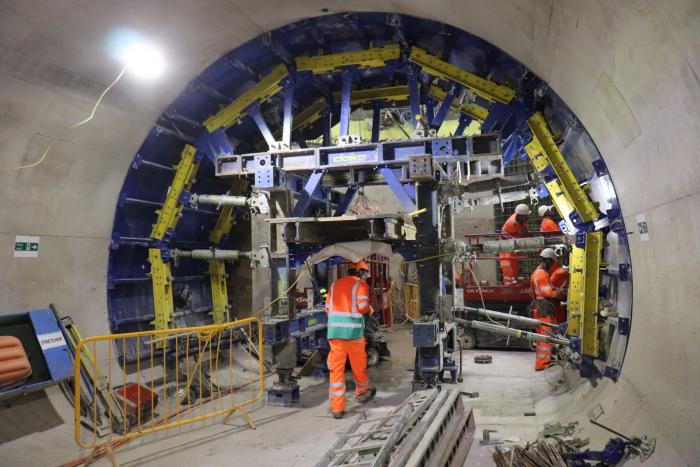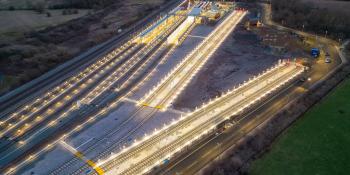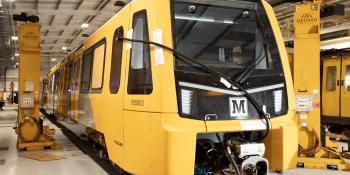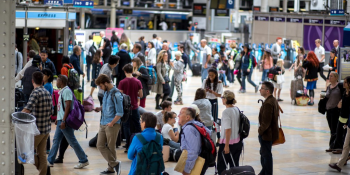This year’s Rail Wellbeing Live even takes place on 2-3 November. Rail Wellbeing Alliance Chair and Network Rail Southern Region Managing Director JOHN HALSALL talks about this year’s plans.
Rail Wellbeing Live is fast becoming amongst the most important online events in the railway’s calendar. Last year, 16,000 rail staff from across the industry registered to view its online sessions, and in its third year it returns bigger than ever as recognition of the importance of wellbeing grows.
John Halsall has been instrumental in its success and his conviction that the rail industry can and should do more to look after its staff is stronger than ever. Celebrity speakers this year include TV personality Gail Porter, Musician Professor Green, author Tracey Cox, hypnotist Paul McKenna and Falklands War veteran Simon Weston, alongside experts in areas ranging from healthcare, healthy eating, lifestyle, addiction, finance, relationships and much more. Some sessions will be interactive, including a cook-along, yoga and breathing exercises.
All of this is made possible by the pan-industry support of a wide range of sponsors - Alstom, Angel Trains, Arriva, Atkins, BAM, Colas Rail, Eversolt, First Group, Govia Thameslink Railway, Hitachi, Keltbray, Keolis, KPMG, LNER, Network Rail, Octavius, the Office of Rail and Road, Porterbrook, RSSB, Siemens and Southeastern.

As Mr Halsall points out, you’re more likely to have a day off work due to mental health issues than as a result of every possible workplace injury combined. ‘Is it better to react to someone having a breakdown, or to help them avoid having one in the first place?’ he asks.
‘We often talk about health and safety on the railway, but what we really mean is “safety”. We haven’t got to the point where we say that health and wellbeing is more important, even though by any metric you care to measure these things by, improving wellbeing will result in staff taking less time off work and often being happier as well.’
He cites the example of a company employing a masseur to provide staff with shoulder massages perhaps once a month, suggesting that some might snigger seeing that, even though it is intended to improve wellbeing. ‘We’re so immature as a society not to understand that wellbeing is so very important,’ he says.
A clear case
‘There is a massive business case for more health and wellbeing in terms of saving money – but far more important is that it’s about being happy. When did you last see somebody with mental health problems or a bad back laughing at work?
‘Health and wellbeing impacts on our ability to enjoy life. Its impact on productivity is more important than just about anything else we do – and as an industry we just don’t do it,’ he adds. A core philosophy of the RWL sessions isn’t to bash viewers over the head with the proverbial club, but to highlight areas they may want to change in their lives. ‘We want people to do things just a tiny bit differently,’ says Mr Halsall.
In addition to the 50 sessions and more than 60 speakers, this year, the efforts of those who go the extra mile to improve wellbeing will be recognised with two Wellbeing Hero awards, for individuals and teams. The aim is to demonstrate that there are many in the industry who take the wellbeing of their teams and colleagues seriously, and to reward that.
The impact of better wellbeing is real and Mr Halsall is keen for more openness about mental health. ‘I don’t think we talk about the number of people who take their own lives due to a sense of stigma about it. The more we talk about things – the more we have conversations that put these issues on the table, the better able we are to help each other and ourselves. I am absolutely convinced we can save lives and improve peoples’ lives and happiness.’
There is nothing, as far as Modern Railways is aware in any other sector with the breadth, scope and reach of Rail Wellbeing Live. Mr Halsall and the team which puts it together are confident their work is making a difference – a difference based, fundamentally about simply caring for their colleagues across the rail industry. The message that improving wellbeing of staff benefits all is getting across. This year’s event is set to reach more people than ever before.
To register for sessions, visit www.railwellbeinglive.co.uk





